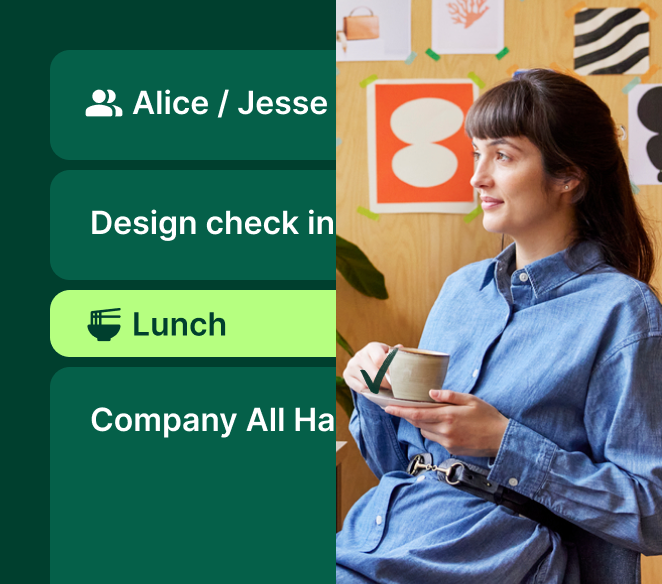Since many of us began to work from home for COVID-19, the average Software Developer has worked two extra hours every day. Overwork and micromanagement are two of the main sources of burnout, according to Venture Capitalist Tomasz Tunguz.
One key to preventing burnout is developing a healthy daily routine. Software Engineers face many challenges when working remotely, from a suboptimal working environment to trouble staying connected with the rest of the team.
Here are some tips to help you optimize your Software Developer daily routine for personal productivity.
Early morning
A great morning routine starts with getting into the right mindset for software development. When we asked people how they’re managing work/life balance in COVID, many said they were continuing to “commute.”
There’s evidence that certain behaviors can trigger our brains to conjure specific thoughts, emotions, and behaviors. If we associate getting up, getting dressed in work clothes, and going to a specific part of the house for work, our brains automatically snap into work mode when we do those behaviors. Before your morning standup, consider going through a work-specific morning routine to get your brain into work mode.
Mid-morning
Now it’s time to get in the swing of the working day. Many people find morning best for working on a project requiring deep focus. Since software development requires a good bit of concentration, you want this part of the day to have as few interruptions and distractions as possible.
Even short interruptions eat away at your productivity. Merely shifting between tasks for a few minutes can cost as much as 40% of your productive time. That’s why highly effective software engineers do what they can to protect their Focus Time.
To reduce uncertainty and interruptions, you can start your week by time blocking your calendar. Rather than sitting down and then deciding what to work on until something more urgent grabs your attention, time blocking is where you decide ahead of time what to work on. Next, you estimate how long you think it will take. Then you schedule time to work on each task on your calendar. This helps ensure that you’re spending time on the most important task in front of you, without distraction.
On subsequent days, you can start your work day by rearranging your time blocks based on what you got done yesterday and anything new that has come up.
Clockwise can help with this. First, we suggest times to meet that open up the most Focus Time for your and your team. Next, our Slack integration shows colleagues whether you’re available based on your calendar for better communication and fewer interruptions. Last, we make it easy to set up and enforce No Meeting Wednesdays (or whatever day your team chooses) for more heads-down time.
Lunchtime
Put down that Soylent! Many hard-working devs skip lunch for more productivity. But, you might be shooting yourself in the foot. Developers who take breaks during the workday end up achieving as much or more than workers who don’t stop to take a walk, stretch, or disconnect from their work.
To ensure you get a break, schedule your lunch like any other appointment. You can also set up lunch events in Clockwise. We’ll protect 30 minutes in the middle of your day for lunch while working around your other meetings.
Afternoon
For many of us, afternoons are a great time for tasks that are a little less focus-heavy. One task to consider working into your daily schedule is answering customer support tickets. GreenPal co-founder Zach Hendrix spends 15 to 20 minutes every day on this task to remind him “that the customer is the center of everything we do and to keep myself close to their perspective and their logic,” Hendrix said.
Afternoons are also a great time for checking in with stakeholders and colleagues. This is when you check for duplicate work, for instance. Scheduling blocks of time for catching up on communication helps ensure you’re not constantly interrupted by incoming messages. And it also helps ensure you’re not making people wait too long for a response. This can be a great time to take a break from your focus-intensive development work to listen to music or otherwise chill a bit.
Evenings
Your day to day will be a lot more pleasant and productive if you’re getting enough sleep at night. “Younger app developers may think getting a full eight hours of sleep is unnecessary — and we probably would have agreed with them too, at one point,” Proto.io writes. “Sleep might be inconvenient at times (there’s just so much to do!), but it’s also very necessary for your brain and body to function properly.” Studies show sleep deprivation makes you dumber.
Don’t sacrifice long-term health and productivity for short-term gain.
Clear boundaries between work and home life can help you shut down at the end of the day. There’s nothing relaxing about answering Slack messages ten minutes before bed. If you’re on call, encourage your organization to move away from this by automating your deployment process.
Going forward
If you’re one of thousands of Software Developers who works remotely due to COVID-19, your typical day has likely been totally upended. While this uncertainty is hard, it’s a great opportunity to develop a new healthier Software Developer daily routine.
These small tweaks to your morning routine, lunch break, and work hours can help you supercharge your day.






